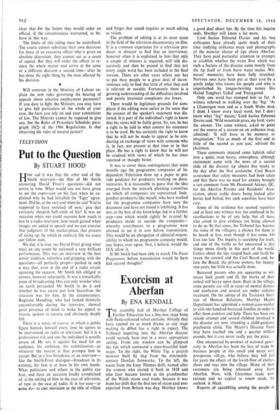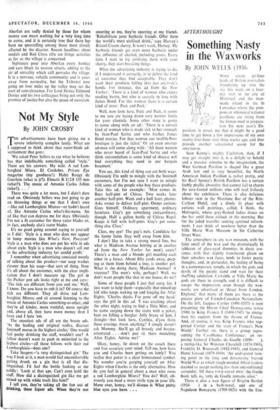Exorcism at Aberfan
By ENA KENDALL
THE assembly hall of Merthyr College of Further Education has a fine new stage hung with flame-coloured velvet curtains. Already they have opened on as much drama as any stage making its abut has a right to expect. The Tribunal inquiring into the Aberfan disaster could scarcely have met in a more appropriate setting. From any window can be glimpsed the tips which command a once-beautiful land- scape. To the right, the White Tip, a greyish monster built by slag from the nineteenth- century Dowlais Ironworks. To the left, the waste from the Lucy Thomas drift, named after the woman who started it back in 1818 and who later became known as the grandmother of the Welsh steam coal trade, because it was from her drift that the first ton of steam coal ever exported from Britain was dug. Merthyr knows a good deal about tips. By the time this inquiry ends, Merthyr will know a lot more.
Lord Justice Edmund Davies and his two colleagues have already spent much of their time studying ordnance maps and photographs of the monster cluster of tips above Aberfan. They have paid particular attention to attempts to establish whether the water flow which was such a feature of the disaster came mostly from the tip itself or from burst water mains. Wit- nesses' memories have been fully stretched. Nervous ones have been put at their ease by a gentle judge who knows his people and who is unperturbed by tongue-twisting names like Hafod Tanglwys Uchaf and Ynysygored.
Only one word has stumped him so far. A witness referred to walking over the 'feg.' As a Glamorgan man and as a South Wales man, I think I know every local word, but I don't know what "feg" means,' Lord Justice Edmund Davies said. 'Wild mountain grass, my lord,' came the answer. The same witness, asked to point out the source of a stream on an ordnance map, admitted: 'It will have to be memory or imagination.' Use as much of the first and as little of the second as you can,' advised the chairman.
These comments injected some lightish relief into a quiet, even heavy, atmosphere, although excitement came with the news of a second slide of the disaster tip almost five weeks to the day after the first avalanche. Coal Board assurances that safety measures had been taken and that there was no need for anxiety brought a tart comment from Mr Desmond Ackner, QC, for the Aberfan Parents and Residents' Asso- ciation, about stable doors being locked after horses had bolted, but such asperities have been rare.
Some of the evidence has seemed repetitive and at least one witness was too confused in his recollections to be of any help, but all those who asked to give evidence are being allowed to do so. In that sense, the Tribunal has become the voice of the villagers, a chance for them to be heard at last, even though it has come 144 lives too late. The inquiry is searching for truth, and one of the truths so far uncovered is that things move slowly in this part of the world. Letters about the tips ranged back and forth be- tween the council and the Coal Board and, be- fore the Board, the private owners, for twenty- two years, but little was actually done.
Bereaved parents who are appearing as wit- nesses look gaunt and ill, the marks of their ordeal still heavy upon them. Back in the village, some parents are still in states of mental distress and confusion and several are under sedative treatment. On the advice of the Tavistock Insti- tute of Human Relations, Merthyr Health Department has appointed a woman case-worker to visit one hundred bereaved families in order to offer them comfort and help. There has been one suicide attempt and several children involved in the disaster are now attending a child-guidance psychiatric clinic. The Mayor's Disaster Fund may have reached one and a quarter million pounds, but it can never really pay the price.
One unexpected by-product of national gener- osity to Aberfan has been the loss of trade by business people in this small and never very prosperous village, who believe they will feel for years the effects of the lavish flow of clothes, shoes and toys into the village. Many of their customers are being rehoused away from Aberfan. Now, with Christmas trade non- existent and no capital to renew stock, the outlook is bleak.
Reports of squabbling among the people of Aberfan are sadly denied by those for whom money can mean nothing for a very long time to come, and it is certainly true that there h.3s been no quarrelling among those most closely affected by the disaster. Recent headlines about medals and Red Cross rifts are fringe activities as far as the village is concerned.
Sightseers pour into Aberfan every Sunday and cars block its narrow streets, adding to the air of unreality which still pervades the village. It is a nervous, volatile community and is years away from normality, but the Tribunal now going on four miles up the valley may see the start of convalescence. For Lord Justice Edmund Davies and his two colleagues bring not only the promise of justice but also the peace of exorcism.































 Previous page
Previous page